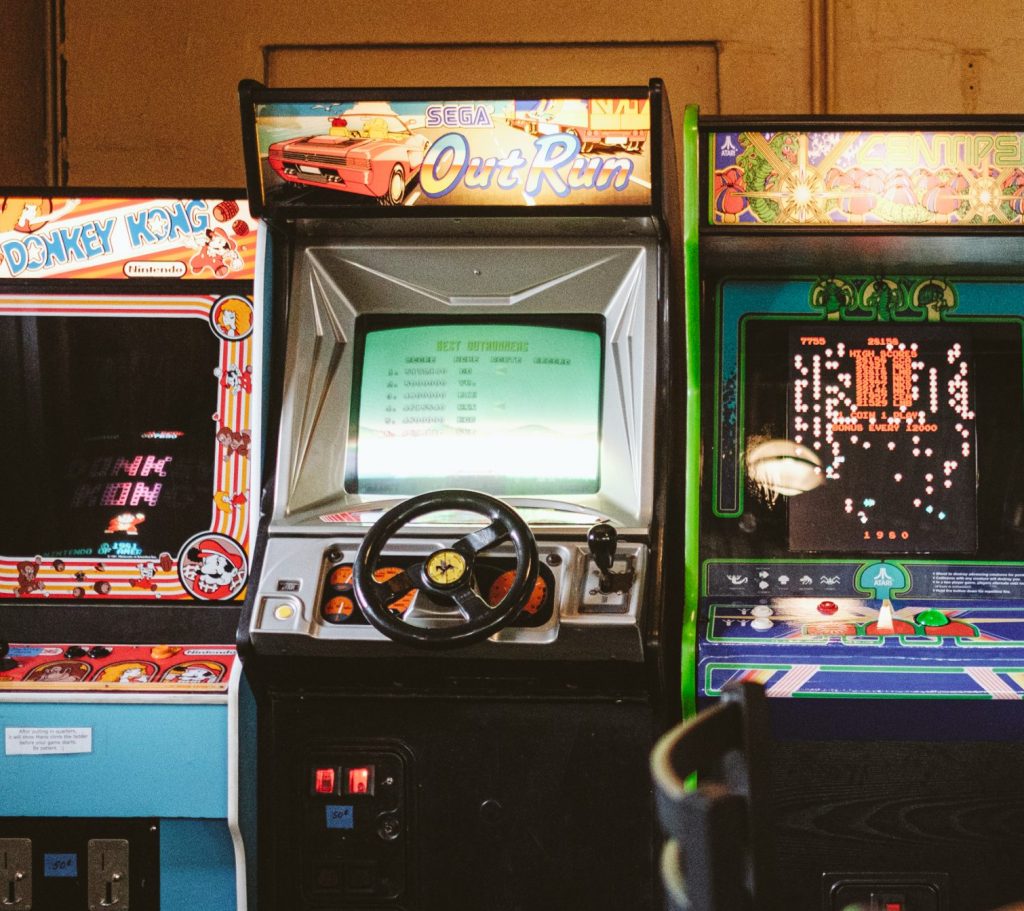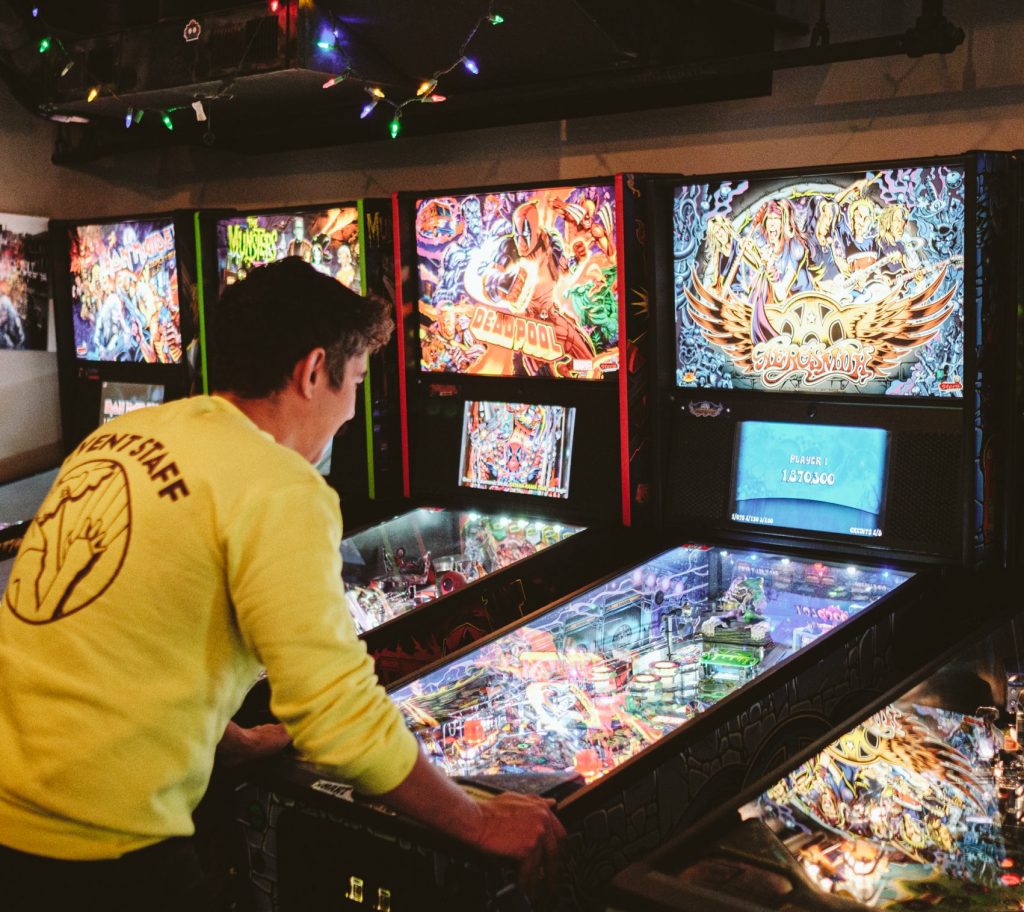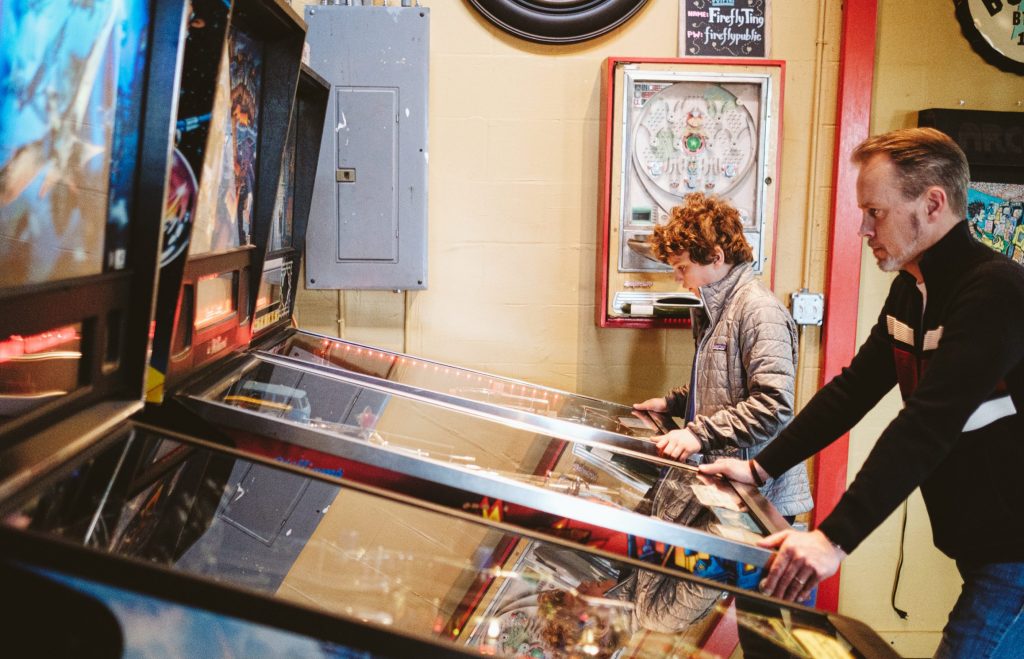I grew up playing video games on my mother’s lap. We had all four Microsoft Entertainment Pack collections on our Windows 95 Gateway PC, from Minesweeper to Chip’s Challenge. Tetris was a favorite—still is—as the satisfaction of clearing lines in a never-ending falling block puzzle seemed to have a grip on some primal part of our brains. As I grew tall enough to reach the mouse and keyboard on my own, I explored other games like SkiFree and the digital conversions of Hearts and Solitaire. Soon enough, as I saw other kids catching ’em all with Pokémon Red and Blue, I asked for my own Game Boy Color so I could trade and battle with friends.
I’ve played video games with so many different people in my life, but ultimately I trace my love of games to my mom, who sank countless quarters into arcade and pinball machines during nursing school and played Atari with her brothers growing up, competing to stack up the most extra lives possible in Pac-Man. To be introduced to so many blinking lights and whooping sound effects by her was to be granted a kind of inheritance, a call to carry my family’s love of social games forward. In the same way that my older relatives would pack into my grandmother’s back room in Queens and argue in Spanish over smoky games of dominoes, I’ve since gathered my mom, uncle, and sister’s fiancé together for tense rounds of the cooperative restaurant management game Overcooked.
So when I moved to Charlottesville, I naturally turned to games to stay connected with people. Online matches of Halo Infinite are weekly fixations with my closest friends, and the latest Pokémon title has kept another good friend and me talking for weeks. But as I started to explore the city, I noticed something: Charlottesville loves games, too. Like, more than many people realize, and perhaps even more than my hometown of Richmond. There’s a deep vein of pinball machines and arcade games running through the city, from the vintage to the exceedingly modern. Miller’s, Champion Brewing, and Lazy Parrot each celebrate the classic bar pairing of alcohol and pinball. Firefly’s game room wows with a thoughtfully curated mix, while Bowlero dazzles with cutting-edge machines and prize dispensers. You can take a tour of the entire history of arcade amusements with the staggering selection of games at Decades, and discover more ways to play at Brightside Beach Pub and Dürty Nelly’s.

I have no doubt that there’s even more out there—every time I stepped into one place, someone would tip me off to two others.
But any old watering hole or laundromat can set up shop with a Ms. Pac-Man cabinet. It takes an intentional choice of machines to really make a game room stand out. Firefly’s lineup is one of the most famous in town because it hits all the right notes with its array of classic and well-loved titles.
“Our games are a little bit on the older side. Vintage, retro, whatever word is appropriate,” says Melissa Meece, owner of Firefly. “You’ve got the parents coming and saying, ‘Oh, I remember Out Run,’ right? … And if you have kids, you wanna bring them in and say, ‘Hey, play this game that I played when I was your age.’”
Firefly’s Out Run was actually the first thing that tipped me off to Charlottesville’s gaming scene. I was out at dinner when I noticed Sega’s classic driving game, which I had sunk hours into at home but had never seen in the flesh, squeezed between Donkey Kong and Centipede. I couldn’t believe it: a true blue Out Run cab. It’s a monumental piece of video game history, perhaps the first game simply about the thrill of driving—a racing game so stylish it opens not with a starting grid but with a radio dial so you can pick your tunes.
Inspiring such delight seems to be the theme for Firefly’s game room, which has been a feature of the restaurant since it opened in 2014. Meece recalls that her partner Mark Weber envisioned Firefly from the outset as a blend of craft beer and old-school arcade games. It was his longtime passion project, one crafted during a bout with cancer that ultimately took his life just two months after the downtown spot opened.
Though Weber had never run a restaurant before, he tapped into something essential about arcade games: their undeniable connection to bars. Long before the advent of the “barcade,” video games were market tested and ultimately flourished in the hands of bar and restaurant patrons, who could challenge each other to games of Pong or Space Invaders between sips. That tradition is alive and well in Charlottesville, where you can play the No Fear, Monopoly, and Harley-Davidson pinball machines in the smoky game room at Miller’s, or head to Champion Brewing and cozy up to their five flashy LCD panel-equipped pinball games themed after Jurassic Park, Deadpool, and more. It’s really something watching scenes from “The Munsters” play intermittently on its appropriately ghoulish table.

Nowadays, rather than being a testing ground for new games, Charlottesville restaurants are looking to keep guests coming back for the games they know and can master. Patrick McClure, owner of Lucky Blue’s and Brightside, says the games in the beach pub were selected because “we wanted some of those throwback machines.”
“Golden Tee and Buck Hunter used to be the big machines, especially on the Corner,” says McClure, who hopes to get a Big Buck Hunter machine in Brightside someday. “That was like the thing we all got really good at 10, 15 years ago.”
If you can’t wait to try Buck Hunter and don’t mind driving up 29 North, you can play it alongside the blisteringly modern selection at Bowlero, where the norm is ceiling-high screens for eye-spinning games like Space Invaders Frenzy and huge car seats for over-the-top racers like Cruis’n Blast (which only features a gas pedal because it’s so intense that there’s no reason to brake). Of course, Bowlero fills another classic gaming niche: the bowling alley plus arcade.
But perhaps no place attracts pinball and video game devotees like Decades. The only true arcade in town, Decades is built on the personal collection of Dr. Paul Yates, an ophthalmologist at the University of Virginia. Fittingly, the arcade features machines from across the ages, with an impressive collection of early pinball dating back to the 1950s with Gottlieb’s Silver, up to the modern day with a Stern machine themed after the Disney+ show “The Mandalorian.”
I’ve been to Decades twice, and each time I’m in awe at its veritable museum’s worth of historic games in tip-top condition. Its vintage pinball machines are mechanical marvels that jitter and shunt into action as they start, resetting counters and feeding in a metal ball to ready up a new game. Classic ’80s video games are completely intact with their unique hardware: Zaxxon uses a flight stick to control your spaceship; Turbo has a wheel, pedal, shifter, and even faux gauges; Reactor has its rolling trackball; and Arkanoid has its spinning paddle. And there are fascinating oddities like Baby Pac-Man, which combines a physical pinball table with a video screen of traditional Pac-Man maze chase gameplay, swapping between the two as you play.

Some of these games I had only ever read about—and yet here they were in Charlottesville.
“We really are passionate about being a teacher in the community,” says Lindsey Daniels, who joined Decades as arcade manager after a career in restauranteering. Daniels has meticulously laid out each space in the arcade by theme, era, tech, and popularity. “A lot of what we have in there is part of history, not only from the history of gaming but also from the history of STEM, like what was happening in computers and electronics at that time, and then just actual American history. … I like to group by when things happened. I have worked on the pinball room to pretty much do that, so that each row makes sense as to a decade.”
“I look for things people will like, but also things where they have no idea it existed,” says Yates, who began Decades as Paul’s Pinball Palace in 2018. Yates says the business acquires many of its games broken, but he sources parts to repair the machines to their original form. It’s common for arcade game collectors to swap out old finicky cathode ray tube monitors with LCD screens, but Yates wants to remain faithful to the game’s engineering. “That’s how I played the game to begin with, and that’s how I want to continue to play the game. So, I will go repair whatever needs to be done on the CRT until it’s literally on its last legs and you just can’t use it anymore. And in that case I will find another CRT.
“You can’t just sit on a couch playing a [PlayStation 5] and replicate what I’ve got there.”
On a Sunday at Decades, as I fiddled around with a new Alien-themed pinball table, a group of about six kids streamed in. After getting their wristbands, they excitedly peeled off to different rooms, hands ready to play games several times their ages. I feel like one of them when I tilt a joystick or pull the plunger on a pinball machine. It’s a raw thrill shooting through a wild nerve that connects me to something timeless, something generously passed down to me by another generation.
